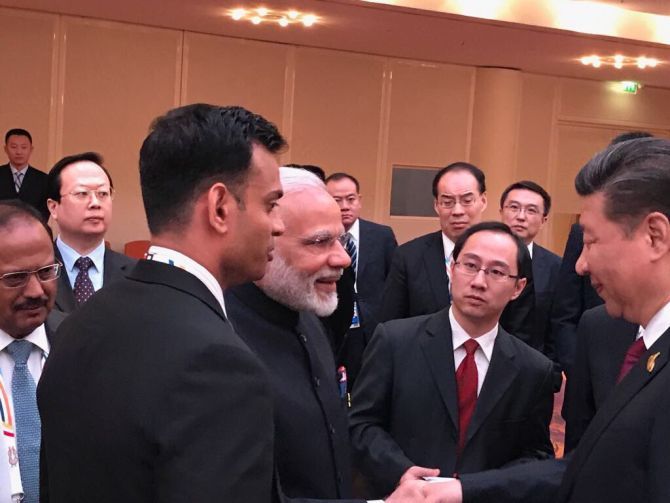'India stands to gain immensely by forging a developmental partnership with China.'
'While through sustained strategic communication there is scope to steadily expand the commonality of interests between the two countries.'
'This is also a practical way to ensure that differences do not get over-magnified and become disputes,' says Ambassador M K Bhadrakumar.

IMAGE: Prime Minister Narendra D Modi greets Chinese President Xi Jinping at the BRICS leaders' informal gathering on the sidelines of the G20 summit in Hamburg, Germany, July 7, 2017. Photograph: @MEAIndia/Twitter
Prime Minister Narendra D Modi had a most meaningful phone conversation with Chinese President Xi Jinping on Tuesday, March 20.
In a profound gesture, Modi followed up his earlier congratulatory message to Xi on the latter's recent election as president for a second term with a phone call.
The Xinhua report on the conversation highlights that the two countries are striving to put behind a particularly bad year in the relationship and move forward.
Modi expressed India's interest in enhancing high-level exchanges, deepening bilateral ties, strengthening cooperation and coordination in international affairs with a view to forge a developmental partnership in the interests of global and regional peace and development.
On his part, Xi also affirmed the desire to build a closer developmental partnership at the bilateral level through the deepening of pragmatic cooperation and referred to the commonality of interests in promoting multipolarity and economic globalisation in the world order.
The salience of the conversation lies in the powerful signal Xi conveyed to underscore Modi's crucial leadership role in steering the relationship forward at the present historical juncture: 'I would like to enhance communication with Mr Prime Minister on the overall, long-term and strategic issues in China-India ties as well as the global and regional situation, so as to enhance political mutual trust, provide important guidance for bilateral ties and continue to upgrade the development level of the relationship between the two countries.'
Without doubt, Beijing has carefully assessed the various moves by Delhi starting from early February, flagging interest in a reset in the relationship. Xi assured Modi that China will work with India to maintain such a momentum.
In immediate terms, this phone conversation provides a conducive setting for the forthcoming visits by External Affairs Minister Sushma Swaraj and Defence Minister Nirmala Sitharaman to China in April.
Of course, a window of opportunity comes to launch a new level of developmental partnership when Modi meets Xi on the sidelines of the Shanghai Cooperation Organisation summit (June 9) in Qingdao, China.
Various disgruntled elements in Indian opinion, who seem crestfallen that there is a turnaround from the 'muscular', confrontational course in India-China relations are up in arms -- some openly, some covertly.
It is unfortunate -- even, tragic -- that some Indians could be so utterly delusional about India's capacity at its present stage of development to sustain a confrontational policy toward China, which has an economy five times the size of our country and a comprehensive national power manifold ours.
But, fortunately, the government can ignore these maverick opinions. For, there is a broad consensus of national opinion behind the government's recent overtures to China.
In particular, the foreign policy resolution adopted by the Congress party at its 84th plenary session last week in Delhi stressed the 'urgent need to... improve communication and trust with China.'
The resolution stated:
'India and China share a complex and demanding relationship, China being a large neighbour and a major trading partner. The rapid rise of China and its emergence as a major power, is and will continue to be a significant factor for India. Our approach to China must not only be marked with pragmatism, but also realism. It should remain our endeavour to work for peaceful resolution of all outstanding issues.'
'India and China have shared objectives in promoting a new global governance architecture, aligned with their own interests. The Congress recalls that in 2005, India and China had reached a broad consensus in taking the relationship forward. This was enshrined in the strategic and cooperative partnership established between the two countries and the adoption of a set of political parameters and guiding principles for the settlement of the India-China boundary question.'
'These should be reaffirmed and continue to be the basis on which, India should engage China.'
Nonetheless, nasty headwinds can be expected in the run-up to Modi's meeting with Xi in June, reminiscent of the earlier concerted attempt to derail the then newly elected Indian prime minister's striving to stimulate a new creative direction to India-China relations one balmy afternoon on the banks of the Sabarmati in September 2014.
Of course, circumstances are vastly different today. Modi is a battle-scarred veteran on the diplomatic arena today and will not brook in-house sabotage of his foreign policy agenda (which is also inextricably linked to his development agenda).
More importantly, he is a hard-headed statesman to realise that the 'muscular' policy has exhausted itself through the past three year period and proved to be a road to nowhere.
Above all, the regional and international situation has transformed.
The North Korean issue is going to be the core of the power dynamic in the Asian region in the foreseeable future.
For President Donald J Trump personally, a do-or-die situation is arising which can make or mar his bid for a second term in the White House. And, to be sure, Trump needs all the help he can extract out of Beijing.
On the other hand, the Trump administration also appreciates the centrality of Pakistan in reaching any orderly settlement in Afghanistan.
Thus, the writing is there on the wall.
Apart from taking advantage of any rising India-China tensions to sell more weaponry to India, the Trump administration is not in the business of building up India as a 'counterweight' to China.
Suffice to say, our leadership is displaying pragmatism to navigate India's long-term interests through a very difficult corridor of time.
Realistically speaking, India stands to gain immensely by forging a developmental partnership with China.
While through sustained strategic communication there is scope to steadily expand the commonality of interests between the two countries.
This is also a practical way to ensure that differences do not get over-magnified and become disputes.
Fundamentally, all this involves coming to terms with China's rise as a global power.
So long as China is not burning midnight oil to stop India's rise, there is no reason to be consumed by anxiety or angst.
China is smart enough to know that India's rapid growth and expanding middle class, the imperatives of infrastructure development and so on make it an extremely attractive partner in economic cooperation.
On the other hand, there can be no two opinions that China is the best partner we could have to ramp up job creation and pitch for a double-digit growth rate through the next decade or two that can transform India as a middle income country.
The current priorities are clear.
In the final analysis, politics is neither for the fanatic nor for the squeamish and the faint-hearted.
No one can accuse the Modi government for being squeamish towards China.
The challenge is to marginalise the fanatics.










